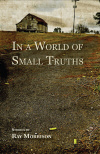In a World of Small Truths
Southern discomfort informs Ray Morrison’s short story collection In a World of Small Truths, yet the unease that permeates each story comes distinctly from the New South, nowhere near the traditional gothic trappings of Faulkner or O’Conner. Still, Morrison’s voice is that of an insider, often reflecting on a youth long gone, not unlike a more collective longing for those lost antebellum days.
Southern discomfort informs Ray Morrison’s short story collection In a World of Small Truths, yet the unease that permeates each story comes distinctly from the New South, nowhere near the traditional gothic trappings of Faulkner or O’Conner. Still, Morrison’s voice is that of an insider, often reflecting on a youth long gone, not unlike a more collective longing for those lost antebellum days.
Morrison’s “haunted” characters gracefully transform from the generic to the specific. In “Calvin Bodenheimer and the Dalrymple Bull,” a long remembered boyhood crush transfers into a codifying adult satisfaction for staying put in one’s hometown. In “Allison Tarleton’s Jar,” memories of an eccentric mother of a childhood friend eases the painful complications of family planning. The retiring dentist in “Extraction” still clings to the forgiving letter of a mother whose son died the previous year from surgical complications.
Like the letter, forgiveness readily appears in most of Morrison’s longer stories. This would feel repetitive and forced if the guilty weren’t so well drawn. A racist, violent father in “Who’s the Victim Here?” simply isn’t capable of knowing how terrible he is, so his son must accept him for the basic care he once provided as a father. In the exquisite “Family Tree,” another grown son must forgive himself for simply handing his alcoholic father the sled with which the father plowed headfirst into a tree. When his older brother buys the old family house years later, the son subconsciously finds himself taking a hatchet to the tree, as if blaming the oak: “the tree’s rough, cracked bark was unblemished in any way that would show the world the result of its unforgiving hardness.”
Morrison demonstrates his own “unforgiving hardness” in a few short violent tales. In “Lenny and Earl Go Shooting off Their Mouth,” the two titles characters go full Tarantino on each other, a la Reservoir Dogs, after their heist goes bad. In “S,” a suicidal father dresses as Superman and heads toward the ledge after surviving a car crash that has taken his wife. “Spring Planting” references the resting place for a cheating husband, but only after his wife confronts the cuckolded husband with a shotgun.
As visceral as these brief flashes of carnage can be, they can’t compete with Morrison’s two best stories, each distanced, measured tales about the mysteries that surround the New South.
“Cityscape” artfully discards the traditional short story form, providing a three-part vision of an unnamed Southern metropolis. The first tracks the tensions accompanying evangelism in an everyday neighborhood. The second tackles wealth and political privilege in contrast to extreme urban poverty. The third and culminating part considers how a rural shack, home to an old man living out of the time with the 21st century, can exist tucked away amidst suburban sprawl.
This theme returns in the collection’s highlight, “A House Divided,” in which a high school history project on Abraham Lincoln transforms a local lawyer’s daughter into a figure from the Civil War. At first the community is simply amused, then worried about her, and finally offended so much that the lawyer begins to lose clients because of his daughter’s penchant for wearing corsets.
The father’s touching resolution to this conflict is as good as any statement yet made about how the New South possesses the ability to simultaneously transcend and honor its glorious, if contradictory, past—a concept Morrison illuminates superbly in these stories.





